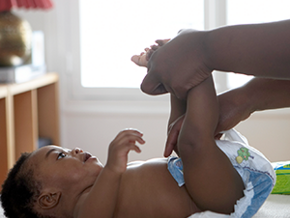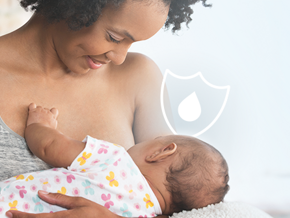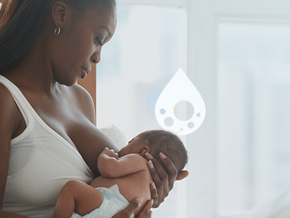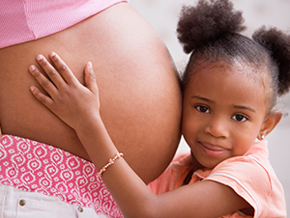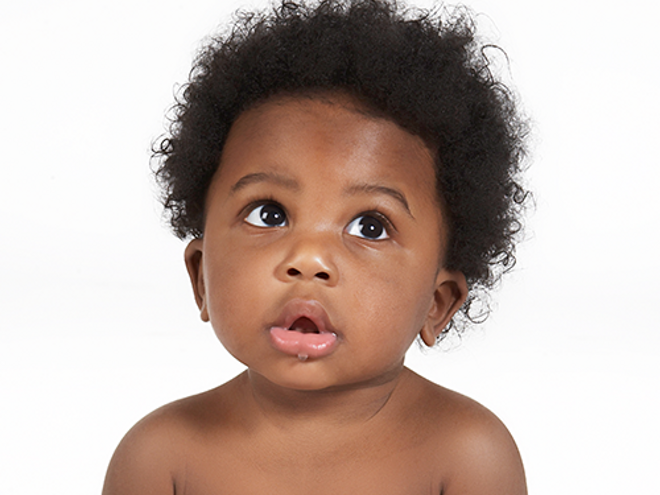
Key Concepts Covered:
Month 4– Practice Communicating
Month 5 – Explore What's At Hand
Month 6 – Channel That Energy
Month 4 – Practice Communicating
Let's talk baby talk! No, not words just yet, but the language basics begin here!
Listen for repetitive, high-pitched giggles, shrieks and noises as your baby shapes his mouth to change sounds. You may even hear him practice one sound over and over. Any day now, your baby will realize that people and things have names—an essential language step!
Shaping baby's language skills:
Repetition:
- Repeat your baby's name and names of favourite toys (any object he likes, really), it's a great way to teach new words.
Sign Language:
- Incorporate basic sign language words like EAT, DRINK and MORE to help avoid frustration before he learns to speak.
Helping your baby move:
- Watch him inch along a blanket on the floor.
- Expect the head-and-shoulder-raising to continue.
- Pull him to a sitting position from the floor. (Prepare for him to sit alone!)
Focusing on sensory and motor development:
- Give him sense-stimulating toys to grasp (play mats, brightly-coloured squeak toys, soft, bumpy-textured items with knobs, handles and loops—whatever you feel is safe).
Watch out for these actions too since your baby may:
- Squeal and laugh with delight.
- Make "raspberry" sounds with his lips.
- Experiment by making new sounds.
- Make sounds in response to you.
- Track moving objects. (His head and neck are working together!)
- Raise up from his tummy on straightened arms and look all around.
- Reach out for toys and objects. (Stronger hand muscles!)
- Start to sleep through the night. (Phew!)
It is recommended to attend all regularly scheduled child welfare clinics with your health care professionals in the first few years of life.
Month 5 – Explore What's At Hand
Heads up, your baby's about to get more hands on!
Everything from his accuracy in grabbing large objects one-handed, to his ability to hold, inspect and even transfer toys from hand to hand—it will all grow with your baby's dexterity.
Want to help your baby get a handle on things? Pick up the following:
- Toys he can twist, suck on, shake and bang into stuff
- A roly-poly toy that pops right back up when he knocks it over
- Any toy he can push with his feet
- Big cushions for him to crawl over or sit up against with support • Soft balls he'll love tossing and squeezing
- Squeaky toys (Another big favourite!)
- A variety of toys (Think different shapes, textures and bright colours)
Put even more fun in sight:
- Give your baby lots of bright, interesting things to look at on your walks or strolls.
- Play games with mirrors (It's all about visual skills).
- Make silly faces.
What else should you watch for? See if your baby:
- Reaches accurately for large objects (Proof he's honing his hand-eye).
- Holds his head steady when sitting upright. (Neck muscles!)
- Sits supported for extended periods.
- Sits unsupported for a few moments. (Back muscles!)
- Rolls from his stomach to his back and vice versa.
- Mimics sounds and gestures.
- Repeats strings of syllables in a rhythmic way.
- Babbles to get attention.
- Shows positive reaction to different sounds.
- Makes different sounds for different needs.
Month 6 – Channel That Energy
Ready…and action!
Your baby's squirming with energy and his growing muscles will have him arching his back trying to get out of your arms. Don't worry, it's just so he can move around all on his own, and he may even dig fingers or toes into the floor to push toward what he wants.
The best news? You can still join in the fun:
- Place toys just out of reach during play time (on the floor, of course).
- Encourage your baby to roll, crawl and creep towards those toys.
- Place bright, primary-coloured items above the change table to catch his attention.
- Offer toy cups, buckets and watering cans during bath time (You'll inspire lots of movement).
- Talk to your baby (Language development continues).
- Show various objects and gestures as you say each one's name.
- Repeat the sounds as your baby babbles.
- Read books, stories, songs and poems with repetitive phrases.
- Add more sign language—assign gestures to common foods and actions (Your baby will make shapes with his hands before he can speak to you).
Lots of exciting changes are on the way, as your baby may:
- Improve fine motor skills.
- Begin to feel and turn around small objects in his hands.
- Say vowel-consonant combinations.
- Respond to his name.
- Recognize certain words.
- Express unhappiness when a toy is taken away.
- Discover himself more and "talk" to himself in a mirror.
- Bear weight on both legs.
- Explore his environment by putting everything in his mouth (After all, the mouth's the most sensitive body part—it's abundance of nerve endings make it great for exploring).
- Move from one place to the next on his belly.
Despite all the excitement, be aware that it's also possible that your baby starts to develop separation anxiety, where he may cry or be anxious when you're not nearby. (Don't fret, for more your health care professional will be a great resource)
It is recommended to attend all regularly scheduled child welfare clinics with your health care professionals in the first few years of life...
Don't forget, babies reach developmental milestones at their own pace. Always talk to your health care professional if you become concerned about your baby's health or development.

